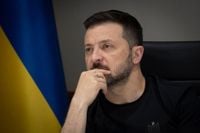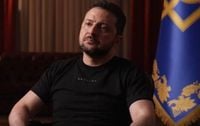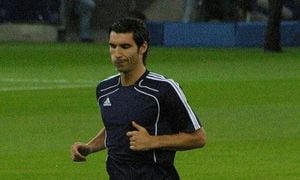Ukrainian President Vladimir Zelensky has taken a significant step in the ongoing conflict with Russia by imposing sanctions against 20 Russian artists, athletes, and cultural figures. This move, announced on April 18, 2025, is part of a broader strategy to counteract what the Ukrainian government perceives as support for Russian aggression against Ukraine.
The sanctions, enacted through decree #246/2025, follow a decision by the National Security and Defense Council of Ukraine (NSDC) and are aimed at blocking assets, prohibiting trade and business activities, preventing real estate purchases, and revoking state awards for those listed. The decree was published on the official website of the President's Office, highlighting the government's commitment to holding accountable those who publicly support the ongoing military actions by Russia.
The list of sanctioned individuals includes a mix of actors, musicians, and athletes, such as actor Nikita Dzhigurda, singer Yaroslav Dronov (known as SHAMAN), actor Yuri Kuklachev, fencer Sofia Velikaya, and rock musician Igor Sukachev. Other notable names on the list are boxer Denis Lebedev, theater actor Evgeny Mironov, ballet dancer Nikolai Tsiskaridze, and Olympic champion Elena Vyalbe.
According to the decree, these individuals have been identified as supporting Russian aggression against Ukraine through their actions and public statements. This latest round of sanctions builds on previous measures taken by Zelensky, which included sanctions against artists who expressed support for the war, such as Ani Lorak and Taisia Povaliy, both of whom lost their state awards as a result.
In November 2024, Zelensky had already signed a decree targeting several high-profile figures who were seen as traitors for their support of Russia in the conflict. This included stripping Russian singers Nikolai Baskov, Filipp Kirkorov, and Alexander Malinin of their titles as People's Artists of Ukraine, alongside other Ukrainian artists who had similarly supported the war.
The sanctions also extend to former Ukrainian officials who have been accused of treason, such as Viktor Medvedchuk and Nikolai Azarov. The Ukrainian government has made it clear that it will not tolerate any form of support for the Russian invasion, and these sanctions serve as a warning to others who may consider aligning themselves with the aggressor.
This latest action reflects a growing trend in Ukraine to isolate those who are perceived as supporting Russian military actions. The inclusion of cultural figures in these sanctions suggests a recognition of the influence that artists and public figures have in shaping public opinion and narratives surrounding the war.
In addition to the sanctions against individuals, a second document released alongside the decree lists 57 Russian enterprises, including AO 103 Arsenal from Saransk and the Tula Plant of Rubber Technical Products, alongside three Chinese companies. This indicates a broader economic strategy to target not only individuals but also the institutions that support them.
On the international stage, reactions to these sanctions have been mixed. Some observers applaud Ukraine's firm stance against individuals who support the invasion, viewing it as a necessary measure to protect national sovereignty and cultural integrity. Others, however, express concern that such actions could further escalate tensions between Ukraine and Russia, potentially complicating diplomatic efforts for peace.
Moreover, the sanctions against cultural figures raise questions about the role of art and culture in times of conflict. While some argue that artists should remain neutral, others contend that public figures have a responsibility to take a stand against aggression. This debate is particularly poignant in the context of Ukraine's struggle for identity and sovereignty amid ongoing hostilities.
As the situation continues to evolve, it remains to be seen how these sanctions will impact the individuals involved and the broader cultural landscape in both Ukraine and Russia. The Ukrainian government appears committed to its course of action, signaling that it will not shy away from confronting those who are seen as undermining its efforts to resist foreign aggression.
In conclusion, the recent sanctions imposed by President Zelensky mark a significant escalation in Ukraine's response to Russian aggression, reflecting a clear message that support for the invasion will have consequences. By targeting well-known figures in the arts and sports, Ukraine is not only addressing immediate concerns but also asserting its cultural identity in the face of external threats.







